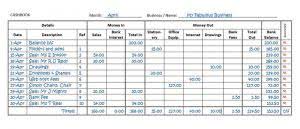How to record prepaid insurance Example

It is the accounting principle that revenue and expense must record based on occurrence. For insurance, the expense is recorded when the company has utilized the service. After 12 full months, at the end of May in the year after the business license was initially purchased, all of the prepaid taxes will have expired. If the company would like to continue to do business in the upcoming year, it will have to prepay again. After 12 full months, at the end of May in the year after is insurance expense debit or credit the insurance was initially purchased, all of the prepaid insurance will have expired.
- For example, when paying rent for your firm’s office each month, you would enter a credit in your liability account.
- At the end of the month, you make an adjusting entry for the part that you did use up—this is an expense, and you debit the appropriate expense account.
- And the company is usually required to pay an insurance fees for one year or more in advance.
- The amount that has expired should be reported as Insurance Expense.
How debits and credits affect liability accounts
- The owner’s equity and shareholders’ equity accounts are the common interest in your business, represented by common stock, additional paid-in capital, and retained earnings.
- The company has paid $10,000 of the insurance premium for the entire year at the beginning of the first quarter.
- The common stock and paid-in capital accounts in the owner’s equity section of the balance sheet are also increasing.
- However, managing debits and credits manually can be time-consuming and prone to errors.
- Insurance premium is the amount of money that an individual or company paid to the insurance company to get the insurance service.
Personal insurance payments are not deductible business expenses so must not go on the Income Statement (Profit and Loss Report). This annual fee can be paid with a one-off payment or it can be spread over 12 monthly payments, or sometimes fortnightly. Prepaid insurance is credited to reduce the asset, reflecting there is now less unused insurance. Before diving into insurance, let’s recap the basics of debits and credits. An accountant would say that we are crediting the bank account $600 and debiting the furniture account $600. In double-entry accounting, every debit (inflow) always has a corresponding credit (outflow).

Definition of Expenses Credited
Thus, XYZ Ltd. would have to pay $2,66,417.54 as an insurance premium for the given year. For example, on September 01, 2020, the company ABC Bakery Accounting Ltd. pays $1,200 for one year of fire insurance which covers from September 01, 2020. Insurance Expense is part of operating expenses in the income statement. Insurance becomes an asset when you experience a risk covered in your insurance plan, which activates your coverage, allowing you to make a claim and receive a successful payout. I am sure if the Accountant wants to change anything, adjusting journals can be done.
- To comply with accounting rules, the customer needs to record advance payment of insurance to current assets on balance sheet.
- On 01 June 202X, ABC sign 12 months contract with the insurance company.
- This is accomplished with a debit of $1,000 to Insurance Expense and a credit of $1,000 to Prepaid Insurance.
- Likewise, the adjusting entry at the end of the period is necessary for the company to recognize the cost that expires through the passage of time.
- The amount paid to acquire a specific coverage is known as “premium”.
Relation to General Ledger, Trial Balance, and Financial Statements:
The customer will record current assets when they make payment to insurance company. At the end of insurance period, all of the prepaid insurance will be recorded as an expense. Passing adjustment entries to balance the books of accounts is often helpful, preventing one from making an entry for new business transactions. To pass an adjustment entry, one must debit the actual expense and credit the prepaid expense account throughout the amortization. This prepaid account will come to the NIL balance at the end of the accounting period and all the expenses accrued in the income statement.

- The initial payment is always debited to prepaid insurance, reflecting the future economic benefit of insurance coverage.
- If you use an expense account, the P&L will show a huge loss in one month (from the damage) and then a huge profit in the month that the insurance check is received.
- As each month passes, the Accumulated Depreciation account balance increases and, therefore, the book value decreases.
- The adjusting entry ensures that the amount of rent expired appears as a business expense on the income statement, not as an asset on the balance sheet.
Generally, Prepaid Insurance is a current asset account that has a debit balance. The debit balance indicates the amount that remains prepaid as of the date of the balance sheet. As time passes, the debit balance decreases as adjusting entries credit the account Prepaid Insurance and debit Insurance Expense. The customers have to pay the insurance premium petty cash based on the contract with the insurance company. It will be classified as an expense over the insurance coverage term. However, the insurance term may be different from the company accounting period.

